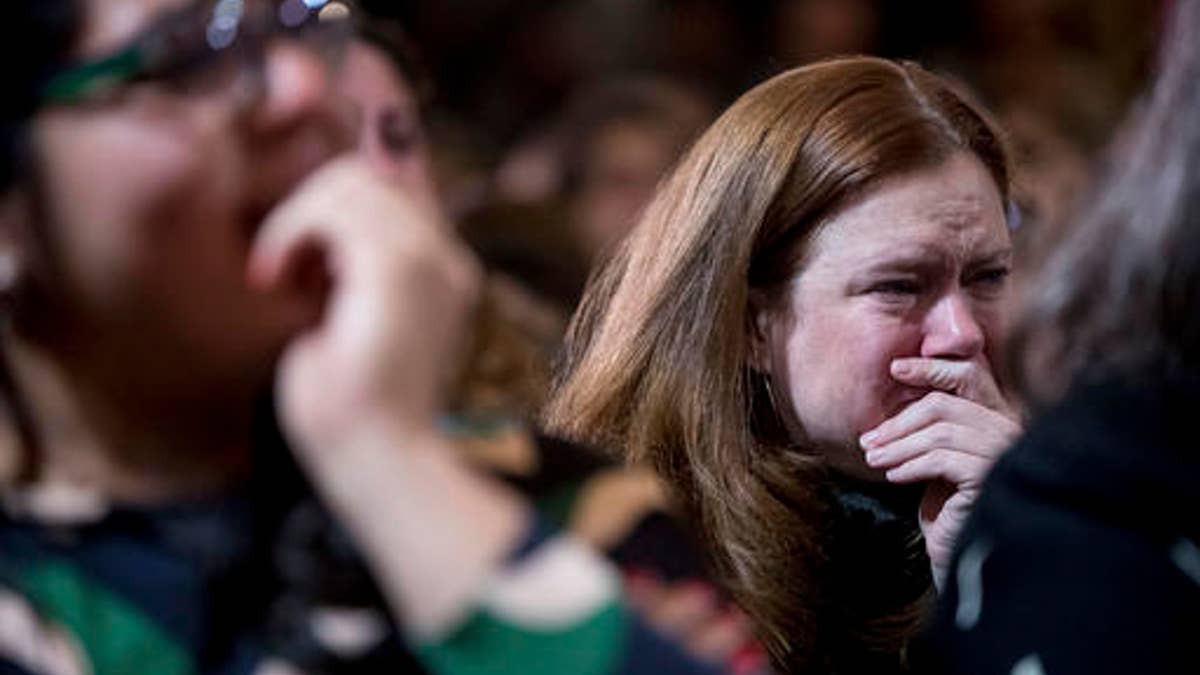
FILE - Staff and supporters listen as Democratic presidential candidate Hillary Clinton speaks at the New Yorker Hotel in New York, Wednesday, Nov. 9, 2016, where she conceded her defeat to Republican Donald Trump after the hard-fought presidential election. (AP Photo/Andrew Harnik)
Regardless of how we may have voted, most of us were shocked by the results of last week’s presidential election. Yet the most astonishing electoral upset in recent history is a lot less astonishing when considered from the perspective of markets. It becomes clear that Donald Trump won because his party embraced free markets. The Democrats lost because, as usual, they rejected them.
We’re not talking here about policy, but the yawning chasm that separates how the two parties see the world. Republicans are commonly ridiculed as the suits, buttoned-up defenders of the status quo. Like most media tropes, this is anything but the truth. However conservative they may appear, under those Brooks Brothers suits and dresses iconoclastic hearts beat. Of the two parties, it is the GOP that understands that real creativity and “change we can believe in” can only come from grassroots forces unleashed by messy, unpredictable markets.
In contrast, the Dems are champions of suffocating rules and bureaucracy that reinforce the power of the establishment. As we’ve learned from the past eight years, from ObamaCare to Dodd Frank to the EPA, they’re the biggest control freaks on the planet. Not only have they sought to control health care and the financial sector, but everything else down to your choice of casual language—and whether your favorite restaurant can have salt on the table. In 2016, this dedication to control and incumbency not only shaped their policies, but also their political strategies—which proved to be their undoing.
In retrospect, the Republicans’ best move was their widely criticized decision to allow their nominee to be selected from a broad field of 17 candidates in a year-long competition that, like most markets, was a messy, brutal free for all. Trump’s victory was typical of the surprises that that can arise from such contests. Free markets frequently confound the “experts,” who initially fail to catch on to shifts in consumer needs and desires—and whose omniscience is generally overrated.
Just the way no one would ever have predicted that we would end up computing on our phones, or that people would spend $5 on branded bottled water—or that a social media website founded by college students would upend the entire world of communication and media—no one ever expected that a political novice, a three-times-married former reality TV star, would ignite GOP excitement not seen in decades.
In contrast, there was nothing surprising about the nomination of Hillary Clinton. The Democrats selected her via a top down process which, like their policies, was predicated on central control by authorities presumed to know best about the needs and desires of their constituents.
Hillary was anointed by the party leadership. With big names like Elizabeth Warren and Joe Biden staying out of the race, she faced a far smaller field of lesser-known candidates. Three of her sparring partners dropped out before the first primary. The fourth, former Maryland governor Martin O’Malley, withdrew shortly thereafter, leaving Vermont Sen. Bernie Sanders as Clinton’s sole primary opponent. While the populist message of the avowed socialist attracted genuine support from political consumers, the Democrats, as we later learned from WikiLeaks, headed off their party’s emerging disrupter.
So the two parties ended up with very different products in terms of the political marketplace. Whatever his flaws, Republican Donald Trump was a thoroughly market-tested entity who had gotten more votes than any other GOP primary winner.
Democrat Hillary Clinton was imposed on voters despite failing a previous test eight years ago against Barack Obama.
That is not to say that Mr. Trump was the ideal pick for many Republicans. Far from it. However, the GOP accepted his primary victory because they understood that, for better or worse, the market had spoken. They embraced their unconventional candidate, even though many did so with no small degree of reluctance.
Not only Democrats, but many Republicans were surprised by the outcome of the election. But, looking back, it makes perfect sense. Donald Trump’s win is a textbook example of how free markets eventually prevail against bureaucratic hubris and central planning.
This is not to imply that, had the Democrats allowed Bernie Sanders to emerge as the nominee, he would necessarily have won. Sanders would still have been the product of a controlled market offering little choice.
Any Democrat would also have represented a third Obama term that voters were desperately seeking to escape. Still, Democrats seeking to increase their chances might consider encouraging a broader, Republican-style “free market” primary in the next presidential election. But my guess is that they won’t. Liberal politicians never tire of attempting to impose top-down “solutions.”
Yet such solutions, like ObamaCare, are destined to unravel because politically-motivated elites are rarely correct about the real world needs and desires of people in a market. That was the case with Barack Obama’s health care law, which was cobbled together by the Democratic establishment and rammed through Congress. And it is why the president’s chosen successor, Hillary Clinton, was a “sure thing” who turned out to be anything but.








































